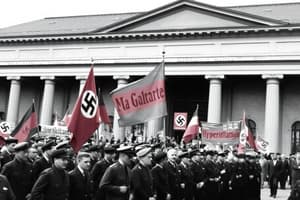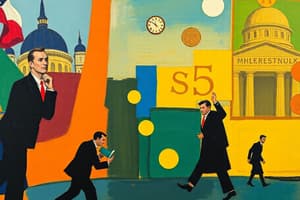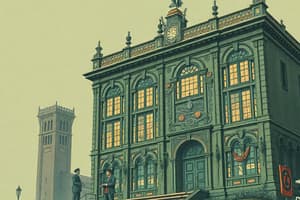Podcast
Questions and Answers
What was one significant economic challenge faced by Germany after the war?
What was one significant economic challenge faced by Germany after the war?
- Rapidly increasing agricultural exports
- High levels of foreign investment
- A balanced budget
- Runaway inflation (correct)
Which group briefly seized control of the government in March 1920?
Which group briefly seized control of the government in March 1920?
- Communists
- Socialists
- Freikorps (correct)
- Trade unions
What was the primary ideological stance of the Freikorps?
What was the primary ideological stance of the Freikorps?
- Communist
- Radically left-wing
- Moderate socialist
- Intensely nationalistic and radically right-wing (correct)
What was the consequence of the general strike called by communists and socialists in Berlin in 1920?
What was the consequence of the general strike called by communists and socialists in Berlin in 1920?
How did the German public express their discontent with the Weimar Republic in the 1920 elections?
How did the German public express their discontent with the Weimar Republic in the 1920 elections?
What happened to the value of the German mark between 1920 and mid-1923?
What happened to the value of the German mark between 1920 and mid-1923?
What was a direct result of hyperinflation for people living on fixed incomes in Germany?
What was a direct result of hyperinflation for people living on fixed incomes in Germany?
What method did the Weimar government initially use to try to stimulate the economy?
What method did the Weimar government initially use to try to stimulate the economy?
What was one of Hitler's main views regarding other people?
What was one of Hitler's main views regarding other people?
What significant event occurred in 1923 regarding the Nazi Party?
What significant event occurred in 1923 regarding the Nazi Party?
What did Hitler do while he was in jail for nine months?
What did Hitler do while he was in jail for nine months?
What strategy did Hitler adopt after his release from prison?
What strategy did Hitler adopt after his release from prison?
Which factor significantly boosted the popularity of the Nazi Party by 1932?
Which factor significantly boosted the popularity of the Nazi Party by 1932?
By 1928, how many members had the Nazi Party grown to?
By 1928, how many members had the Nazi Party grown to?
What was one of the Nazis' main targets for blame during the economic crisis?
What was one of the Nazis' main targets for blame during the economic crisis?
What was Hitler's goal for Germany as outlined in his ideology?
What was Hitler's goal for Germany as outlined in his ideology?
What was one significant outcome of the 1932 elections for the Nazis?
What was one significant outcome of the 1932 elections for the Nazis?
What title did Hitler assume after the death of President Hindenburg in 1934?
What title did Hitler assume after the death of President Hindenburg in 1934?
Which organization was primarily responsible for carrying out arrests and internal security under Hitler's regime?
Which organization was primarily responsible for carrying out arrests and internal security under Hitler's regime?
What method did the Gestapo use to gather information from suspected enemies?
What method did the Gestapo use to gather information from suspected enemies?
What impact did the Great Depression have on the Nazi party's appeal to middle class Germans?
What impact did the Great Depression have on the Nazi party's appeal to middle class Germans?
What did Hitler do to suppress political dissent shortly after coming to power?
What did Hitler do to suppress political dissent shortly after coming to power?
What was one of the first actions taken by Hitler when he gained power?
What was one of the first actions taken by Hitler when he gained power?
How did most Germans respond to Nazi rule during this period?
How did most Germans respond to Nazi rule during this period?
What position did Stalin hold in 1922 that allowed him to influence key party appointments?
What position did Stalin hold in 1922 that allowed him to influence key party appointments?
What was the primary goal of Stalin's economic policies?
What was the primary goal of Stalin's economic policies?
What major transition occurred with the introduction of the First Five-Year Plan?
What major transition occurred with the introduction of the First Five-Year Plan?
What was the outcome for peasants who resisted the government’s push for collectivization?
What was the outcome for peasants who resisted the government’s push for collectivization?
What happened to agricultural production in the Soviet Union by 1932?
What happened to agricultural production in the Soviet Union by 1932?
What was one of the effects of the Soviet government's policies on the Ukrainian population in 1932-1933?
What was one of the effects of the Soviet government's policies on the Ukrainian population in 1932-1933?
Which leader did Stalin view as a rival within the Communist Party after Lenin's death?
Which leader did Stalin view as a rival within the Communist Party after Lenin's death?
What did Stalin do to eliminate his political rivals during his rise to power?
What did Stalin do to eliminate his political rivals during his rise to power?
What economic condition provoked radicalism in German society in the early 20th century?
What economic condition provoked radicalism in German society in the early 20th century?
What event was Adolf Hitler reacting against when he formed the Nazi Party's initial structure?
What event was Adolf Hitler reacting against when he formed the Nazi Party's initial structure?
What did the SA, or Brownshirts, primarily do for the Nazi Party?
What did the SA, or Brownshirts, primarily do for the Nazi Party?
Which treaty did Adolf Hitler's 25-point platform specifically call for Germany to reject?
Which treaty did Adolf Hitler's 25-point platform specifically call for Germany to reject?
How did Hitler rise to leadership within the Nazi Party?
How did Hitler rise to leadership within the Nazi Party?
Which group was significantly represented among the 30,000 Freikorps members in Munich during Hitler's rise?
Which group was significantly represented among the 30,000 Freikorps members in Munich during Hitler's rise?
What year was the German Workers' Party, later known as the Nazi Party, founded?
What year was the German Workers' Party, later known as the Nazi Party, founded?
What was one of the exclusionary goals outlined in Hitler's 25-point platform for the Nazi Party?
What was one of the exclusionary goals outlined in Hitler's 25-point platform for the Nazi Party?
Flashcards are hidden until you start studying
Study Notes
Aftermath of World War I in Germany
- The Treaty of Versailles imposed heavy reparations on Germany, contributing to economic hardship.
- Post-war Germany faced food shortages, high unemployment, strikes, violence, and threats of revolution.
- The Weimar Republic, established after the war, lacked political stability and faced challenges from both the right and left.
- The Freikorps, paramilitary groups, rose to prominence during the post-war period.
- Freikorps groups staged a coup attempt in 1920 to restore the monarchy.
- The Weimar Republic lost its majority in the first elections in 1920, representing growing discontent among the population.
- The government attempted to revive the economy by printing money, leading to runaway inflation.
Hyperinflation in Germany
- The value of the German mark plummeted in the early 1920s.
- In 1920, one US dollar was equivalent to 40 German marks.
- In 1922, one US dollar was equivalent to 18,000 German marks.
- By mid-1923, inflation accelerated rapidly, with bread prices surging from 20,000 marks to 5 million marks in a single day.
- By the end of 1923, one US dollar equaled 4.2 trillion German marks.
- The inflation crisis devastated people's finances and sparked radicalism in German society
The Rise of Adolf Hitler and the Nazi Party
- Hitler, a World War I veteran, joined the German Workers' Party in 1919 and became its leader in 1921.
- The party changed its name to the National Socialist German Workers' Party, or the Nazi Party, in 1920.
- The Nazi Party gained support among war veterans, those dissatisfied with the Weimar Republic, and members of the Freikorps
- The party's paramilitary wing, the SA (Storm Division) or Brownshirts, enforced security at rallies, terrorized political opponents, and engaged in violence.
- Hitler's Nazi ideology rejected Treaty of Versailles, promoted German expansion, and advocated racial superiority.
- In 1923, Hitler attempted a coup in Munich, but it was unsuccessful.
- After his imprisonment, Hitler wrote "Mein Kampf" outlining his plans for Germany.
The Great Depression and the Nazi Rise to Power
- The Great Depression, triggered by the Wall Street Crash of 1929, dealt a major blow to the German economy.
- US loans to Germany were cut off, leading to economic collapse, high unemployment, and social unrest.
- The Nazis exploited economic anxieties and promised restoration of order, prosperity, and national pride.
- The Nazi Party gained significant electoral support, exceeding 100,000 members by 1928.
- By 1932, the party membership had surged to over 1.4 million.
- in 1933, President Paul von Hindenburg appointed Hitler as Chancellor.
Nazi Consolidation of Power
- After assuming power, Hitler swiftly dismantled the Weimar Republic.
- The Reichstag fire of 1933 provided a pretext to suppress political opponents.
- Hitler gained dictatorial powers, outlawed other political parties, and consolidated Nazi control over state and local governments.
- All labor unions were dissolved and replaced with Nazi controlled organizations.
- The Nazi Party's elite troops, the SS (Schutzstaffel), became Hitler's private army and were responsible for internal security.
- The Gestapo, the Nazi secret police, utilized torture, terror, and brutal methods to suppress dissent.
Studying That Suits You
Use AI to generate personalized quizzes and flashcards to suit your learning preferences.




